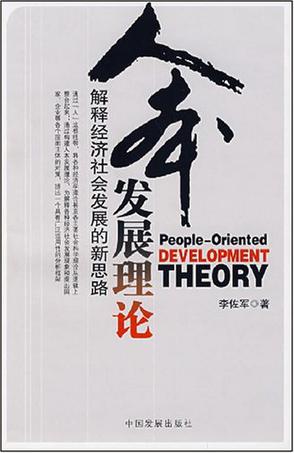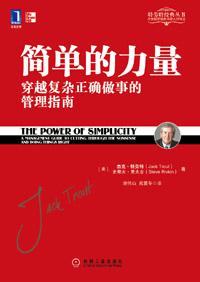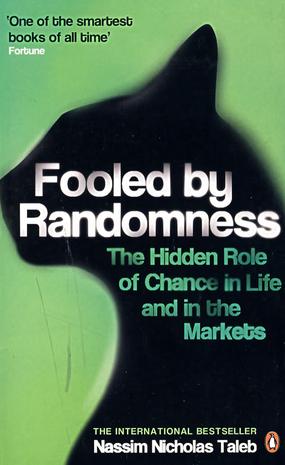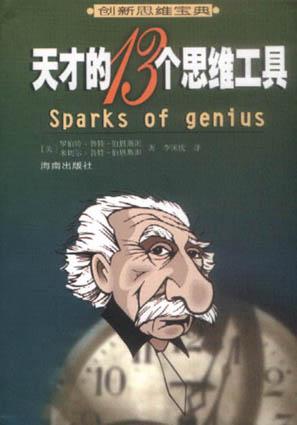-

人本发展理论
《人本发展理论:解释经济社会发展的新思路》内容:会有两大任务:一是认识和改造(或适应)自然;二是认识和发展社会。前者主要是自然科学的任务,后者主要是社会科学的任务。相比而言,人类在认识和改造自然方面取得了更令人瞩目的成就,大到揭示太阳系和宇宙,小到揭示质子和中子。自然科学都有不错的表现。而人类在认识和发展社会方面,大概是因为“身在此山”,反而不如认识和改造自然那么突出,大到社会演变,小到个人行为,都还有很多现象没有很好地解释。 -

简单的力量
"常识让事情变得简单 复杂的语言蒙蔽人的头脑 你是否喜于接受管理新观念,乐于应用新方法,但企业经营并未见好? 若是,你需要本书指点迷津。" "删繁就简的管理之道 从定位角度,对企业面临的各类管理问题精到论述,既涉及企业使命、领导艺术、组织等大的方面,也包括年度预算、定价、营销等日常问题,都提供正确处理之道,是高绩效管理的行事指南。 洞察商业本质,为你分析现代管理变得复杂的原因,给出重回简单的管理原则,指引你真正有效地经营企业。 在本书中,杰克·特劳特为迷失于管理时尚,并诧异为何企业经营没有好转的读者带来现实的希望。本书以直白明晰的语言阐释思考方法,并分析和批判了荒谬的行话。本书中既包括领导艺术、组织等大的方面,又兼顾定价、营销等日常问题。对于每一个问题,都尽力提供正确处理的方法。在阅读本书的过程中,你定会灵光一现,生活从此变得简单,企业变得更富有效率。" -

Fooled by Randomness
《财富》评选的75本商务人士必读书之一。股市的大起大落只发生在须臾之间,借鉴塔勒布的操作手法(这也是不少操盘手正在做的),您将能避免风险,并在黑天鹅出现时大赚一笔。说股票交易者应该人手一册本书绝对不过分。 人的本性经常低估随机现象,我们很需要这样的书。妙趣横生、清新隽永且独具一格,令人玩味无穷。——罗伯特·希勒(畅销书《非理性繁荣》作者) 本书常识性知识俯拾即是。如果你是交易员、科学家,或者哈佛律师,本书必读。——保罗·威尔莫特(《衍生性金融商品》作者) 简单一句话:这本书让人看得入迷。埋首其中,你对生命(以及你的钱财)的了解将大为增进,这可不是随机性的结果。——伯恩斯坦(彼得·伯恩斯坦公司总裁) 当还是股市中的一位菜鸟级别的交易员时,作者塔勒布曾成功地在一次股灾中得以幸免,他潜心半年研究这场风暴,认为他的逃脱不是有比其他人高明之处,完全是运气好——运气在金融市场中起着重要的作用,但是人们却总是过低地估计了随机作用,忍不住想对事物做出自己的解释,这就形成了种种迷信。由此他写作了这样一部关于运气——随机性的书。 塔勒布指出:在基因上,我们仍和未开化的土著人很接近。我们的信念的形成,充满着迷信──即使现今也不例外(或许必须说,尤以今天为甚)。某一天,原始部落的某个人抓了鼻子之后不久,雨开始下了,于是他煞费苦心发展出一套抓鼻子祈雨的方法。同样的,我们会把经济的繁荣归功于联邦储备委员会降低利率;或者一家公司经营成功,竟和新总裁“走马上任”有关。类似风马牛不相及的事件屡屡被我们扯上联系,并导致我们在人生的重要抉择关头步步踏错,先机尽失。 生活中随机性无处不在,即使是专业的数学家,并精于概率的计算,也往往会被随机性所捉弄,塔勒布最后建言:我们虽然无法避免随机性,但我们可以学着接受它。塔勒布的理念已经自成一派,世界上相当多的股票交易员都承认受到他理念的影响——从稀有事件中获取收益。这绝对是每一位证券交易者都应该珍藏的一本书! Everyone wants to succeed in life. But what causes some of us to be more successful than others? Is it really down to skill and strategy – or something altogether more unpredictable? This book is the word-of-mouth sensation that will change the way you think about business and the world. It is all about luck: more precisely, how we perceive luck in our personal and professional experiences. Nowhere is this more obvious than in the markets; we hear an entrepreneur has ‘vision; or a trader is talented;, but all too often their performance is down to chance rather than skill. It is only because we fail to understand probability that we continue to believe events are non-random, finding reasons where none exist. This irreverent bestseller has shattered the illusions of people around the world by teaching them how to recognize randomness. Now it can do the same for you. -

Intuition Pumps and Other Tools for Thinking
One of the world’s leading philosophers offers aspiring thinkers his personal trove of mind-stretching thought experiments. Over a storied career, Daniel C. Dennett has engaged questions about science and the workings of the mind. His answers have combined rigorous argument with strong empirical grounding. And a lot of fun. Intuition Pumps and Other Tools for Thinking offers seventy-seven of Dennett’s most successful "imagination-extenders and focus-holders" meant to guide you through some of life’s most treacherous subject matter: evolution, meaning, mind, and free will. With patience and wit, Dennett deftly deploys his thinking tools to gain traction on these thorny issues while offering readers insight into how and why each tool was built. Alongside well-known favorites like Occam’s Razor and reductio ad absurdum lie thrilling descriptions of Dennett’s own creations: Trapped in the Robot Control Room, Beware of the Prime Mammal, and The Wandering Two-Bitser. Ranging across disciplines as diverse as psychology, biology, computer science, and physics, Dennett’s tools embrace in equal measure light-heartedness and accessibility as they welcome uninitiated and seasoned readers alike. As always, his goal remains to teach you how to "think reliably and even gracefully about really hard questions." A sweeping work of intellectual seriousness that’s also studded with impish delights, Intuition Pumps offers intrepid thinkers—in all walks of life—delicious opportunities to explore their pet ideas with new powers. -

天才的13个思维工具
-

工作中的博弈论GAME THEORY AT WORK
Easy-to-follow strategies for using game theory to grab the upper hand in every business battle game theory - the study of how competitors act, react, and interact in the strategic pursuit of their own self-interest - has become an essential competitive tool in today's business arena. "Game Theory at Work" provides examples of how businesspeople can use this time-proven approach to successfully meet competitive challenges and, more often than not, claim the upper ground in each battle before it begins. "Game Theory at Work" steers clear of the opaque mathematics and pedagogy that so often hamper practitioners of game theory, relying instead on lively case studies and examples to illustrate its remarkable methods in action.Complex yet comprehensible, it provides you with: methods for applying game theory to every facet of business; strategies for instantly improving your position in virtually any negotiation. Game theory techniques to increase the output and value of each employee. At its essence, business is a game, albeit a profoundly serious game that must always be played to win. "Game Theory at Work" is the first plain-English examination of the use of game theory in business. Let it provide you with the intellectual tools you need to instantly understand every game you're playing, use that knowledge to your advantage, and consistently maximize your finish-line payoff. '"Game Theory at Work" won't teach you about power-chants, discuss the importance of balancing work and family, or inspire you to become a more caring leader. This book will instead help you out - strategize, or at least keep up with, competitors inside and outside your company' - From the Introduction.Like Sun Tzu's timeless "The Art of War", "Game Theory at Work" is about knowing your adversary as well as yourself. It is also about using that knowledge to prepare yourself for victory. But above all, this one-of-a-kind book is about dramatically improving your strategic instincts and decision-making skills - and emerging victorious - in virtually any business encounter. Introduced by John von Neumann and Oskar Morgenstern in their 1944 book "Theory of Games and Economic Behavior", and further honed through the decades by thought leaders including Nobel Prize winner John Nash, game theory analyzes strategic interactions in which the outcomes of various choices depend on the choices of others."Game Theory at Work" applies this innovative tool to the world of business, and provides a step-by-step framework for using game theory to improve your on-the-job success in areas including: negotiating; managing; pricing; positioning; establishing; and strategic alliances. More than that, however, "Game Theory at Work" is a one-of-a-kind tool to battle the high costs of indecision. It shows you how to enter any encounter confident in how others will act, and then use game theory to base your strategies and actions on this knowledge. Case studies, puzzles, and, yes, games demonstrate why unexpected and often paradoxical results are the norm when humans compete, and help you use this fact to your advantage. And, chapter-ending lessons highlight essential rules learned...All in a book that is both absorbing and entertaining, designed to improve your business instincts without requiring the use of needless mathematics or theoretical mumbo-jumbo. Everything in life is competitive in one way or another, and game theory has revolutionized the art and science of what to look for-and how to act-when engaged in competition. "Game Theory at Work" studies the use of game theory in today's hard-fought business arena, and shows you how to use it to gain maximum advantage in every professional encounter, whatever your role in that encounter.